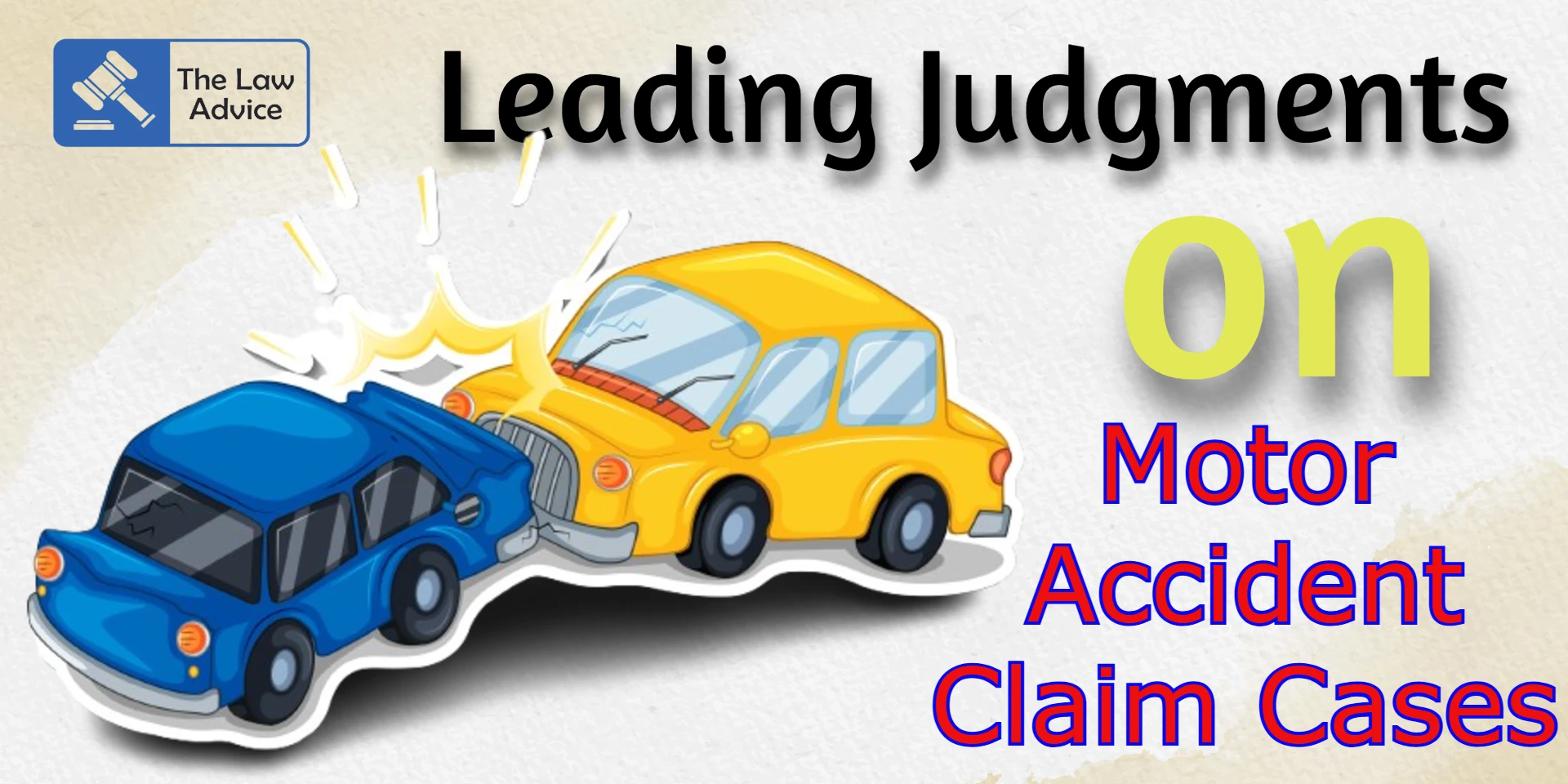Leading Cases on Motor Vehicle Accident Claims
Motor Vehicle Accident (MVA) claims constitute one of the most significant branches of tort law in India, primarily governed by the Motor Vehicles Act, 1988. The legislation provides for compensation to victims of road accidents, either through fault-based liability (Section 166) or the principle of no-fault liability (Section 140). Over the years, the Supreme Court and High Courts have delivered landmark judgments shaping the contours of compensation, liability, and procedural safeguards.
Below are some of the most important leading cases on motor vehicle accident claims:
1. Minu B. Mehta v. Balkrishna Nayan (1977) 2 SCC 441
Principle: Liability arises only on proof of negligence.
The Supreme Court held that in a claim for compensation under the Motor Vehicles Act, negligence of the driver must be proved before the owner or insurer can be held liable. This case highlighted that fault-based liability is the rule, though later amendments introduced the concept of no-fault liability.
2. Gujarat State Road Transport Corporation v. Ramanbhai Prabhatbhai (1987) 3 SCC 234
Principle: Broadening the scope of dependents.
The Court recognized that even persons who were not legal heirs under personal law could claim compensation under the Act if they were dependent on the deceased. This judgment expanded the ambit of “legal representative” under Section 166.
3. N.K.V. Bros. (P) Ltd. v. M. Karumai Ammal (1980) 3 SCC 457
Principle: Liberal approach in accident claims.
The Supreme Court emphasized that in accident claims, the tribunal should not adopt a highly technical approach. Compensation must be awarded on a liberal and realistic basis to meet the ends of social justice.
4. R.D. Hattangadi v. Pest Control (India) Pvt. Ltd. (1995) 1 SCC 551
Principle: Heads of compensation.
The Court classified compensation under pecuniary and non-pecuniary damages. Pecuniary damages include medical expenses, loss of income, etc., while non-pecuniary damages include pain, suffering, and loss of amenities. This case serves as a guide for determining compensation under different heads.
5. Sarla Verma v. Delhi Transport Corporation (2009) 6 SCC 121
Principle: Standardization of multiplier method.
This is a landmark ruling where the Supreme Court standardized the multiplier method for calculating compensation in fatal accident cases. The Court laid down structured guidelines on choosing the correct multiplier based on the age of the deceased or claimant, thereby ensuring uniformity.
6. Reshma Kumari v. Madan Mohan (2013) 9 SCC 65
Principle: Endorsement of Sarla Verma principles.
The Court reaffirmed the structured formula laid down in Sarla Verma and held that it must be followed mandatorily for consistency and certainty in awarding compensation.
7. National Insurance Co. Ltd. v. Pranay Sethi (2017) 16 SCC 680
Principle: Future prospects and conventional heads.
This Constitution Bench decision is one of the most significant in motor accident jurisprudence. The Court:
• Allowed addition of future prospects to income while computing compensation.
• Standardized amounts for conventional heads like loss of consortium, funeral expenses, and loss of estate.
• Reaffirmed structured formula for uniformity.
8. Magma General Insurance Co. Ltd. v. Nanu Ram (2018) 18 SCC 130
Principle: Consortium to family members.
The Court expanded the meaning of consortium to include spousal consortium, parental consortium, and filial consortium. This allowed children, parents, and spouses of the deceased to claim compensation under this head.
9. United India Insurance Co. Ltd. v. Satinder Kaur (2020) 11 SCC 1
Principle: Refinement of non-pecuniary damages.
The Court clarified the scope of compensation under the heads of loss of love and affection and consortium. It reiterated that loss of love and affection is not a separate head, but the claimants can be compensated under the umbrella of loss of consortium.
10. Kirti & Anr. v. Oriental Insurance Co. Ltd. (2021) 2 SCC 166
Principle: Compensation for homemakers.
The Court held that the services rendered by homemakers cannot be considered as “zero value” and must be recognized in pecuniary terms while calculating compensation. This judgment gave due recognition to the economic value of domestic work.
11. Shailaja & Ors. v. Pavan B. Udupudi & Anr. CIVIL APPEAL NO. 840 OF 2025
Principle: Just compensation cannot be denied merely due to lack of income proof; agricultural income includes supervisory charges.
The Supreme Court in this case clarified two important principles:
1. Lack of Income Proof: The Court held that the absence of documentary proof of income cannot be a reason to deny compensation to claimants, especially where the deceased’s engagement in an occupation is undisputed. Courts must adopt a realistic approach, considering that many in India are employed in the informal sector without formal income records.
2. Agricultural Income: The Court further held that when compensation is determined on the basis of agricultural income, it must include supervisory charges for managing agricultural land. Even if the actual agricultural operations continue after the death of the landowner, the deceased’s role in supervision and management must be monetarily recognized while assessing loss of dependency.
Principle: Income Tax Returns are valid statutory proof for determining income in MVA claims.
In this judgment dated 11 February 2025, the Supreme Court granted leave and allowed the claimant-appellant’s appeal, enhancing the compensation significantly. The key principles laid down include Reliance on Income Tax Returns: The Court reaffirmed that Income Tax Returns (ITRs) are statutory documents and can be relied upon by courts and tribunals to fix the deceased’s income, provided the tax payment details are duly supported by evidence—a principle previously reaffirmed in Malarvizhi & Ors. v. United India Insurance Co. Ltd. (2020) and New India Assurance Co. Ltd. v. Sonigra Juhi Uttamchand (2025).
Conclusion
Motor Vehicle Accident law in India has evolved from a strict fault-based approach to a more beneficial and victim-friendly jurisprudence. With decisions like Pranay Sethi and Kirti, the judiciary has attempted to ensure uniformity, fairness, and social justice in awarding compensation. These cases serve as guiding beacons for tribunals, practitioners, and claimants in navigating accident claim proceedings.

